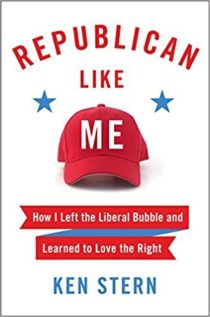Republican Like Me

I am not a Republican. Nor am I a Democrat. I’m an Independent, recently minted. To me, that has meant “Cynically Disaffected with Both Major Parties, but More Conservative than Liberal about Government and Values.” (For short, that’s CDBMPMCLGV, if that makes it any easier to remember.) But I felt some small glimmer of hope when I got to the end of Ken Stern’s Republican Like Me: How I Left the Liberal Bubble and Learned to Love the Right. It’s a difficult book in some ways, but it describes one self-professed liberal’s effort to move beyond the stereotypes and actually get to know some folks at the other end of the political spectrum. Stern, who served a brief stint as the CEO of NPR, looked around his street in D.C. and realized virtually everyone held the same views. So he spent a year mixing with those of a more conservative cast, then wrote this entertaining book.
The title might be a little misleading, depending on how you interpret it. If you think “learned to love the right” means that Mr. Stern became a Republican, it doesn’t. This expectation might be why the review of this book over at the National Review, while generally favorable, suggests it doesn’t ultimately succeed. I can see why the reviewer calls it “sociological tourism,” because at times it felt that way to me — like the author was visiting a different country and reporting on quaint native traditions. But in the end I think the book succeeds, because its author does learn to “love the right” — to respect and care about people who think differently, and to come around to their ways of seeing a few things. And that, not political unanimity, is what we need from all quarters.
Stern examines a number of issues including guns, religious faith, poverty, the Rust Belt, climate change, and the media. In all these areas he works to resist his liberal reflexes and engage in ways that are thoughtful and often funny. President Trump is often faulted, and rightly so, for his careless and blundering talk. But he isn’t the first to disparage whole groups, or to display ignorance without seeming to notice. Remember the basket of deplorables, or the bitter people clinging to guns and religion? The governor of my own fair state told anyone who is pro life or pro gun ownership to leave the state, because “that’s not who we are.” There is enough stereotyping and condescension to go around on all sides, but Stern both avoids these pitfalls and keeps his sense of humor.
At times, I noticed an annoying know-it-all voice nagging at me from within. Let’s face it, Stern is in my territory with some of this stuff, and I wanted to add my two cents. For instance, I’m a lifelong evangelical; he describes himself as “a liberal, secular Jew.” So I kept muttering corrections when he tried to explain the Bible, or drew conclusions based on only a handful of church services, or seemed to think that opinion polls determine doctrine. But at the same time, I trusted him because his liking and enjoyment of people comes through. He comes to realize that though evangelicals certainly have their problems, they have their strengths too. “In the United States,” he points out, “it is more often than not religious people and religious organizations that are running the soup kitchens and homeless shelters and refugee resettlement programs, not law professors at fashionable universities with endowments approaching $7 billion.” (Stern should know. His other book is about charities.) He writes about one particularly inspiring volunteer effort in Oregon that ended up resulting in an ongoing partnership between the church and local government and schools. Getting a good look at the quiet and compassionate witness of many Christians, and recognizing the stable, beneficial moral structure Christianity affirms despite its abandonment in many quarters of our society, ends up tempering Stern’s stereotypes.
I had mixed feelings about a theme that emerged in two chapters (one on coal and one on science): climate change. Coming on the heels of my reading of Wendell Berry, this book seemed to typify some of the more damaging myths he addresses. For instance, though I’m not a climate change denier, I would love to have been provided with some evidence — rather than repeated assertions, three in a single paragraph in one case, that climate change is “settled science” and that “humans are the main cause.” As Berry points out in The Art of Loading Brush, too often the demand for everyone to “believe in” climate change
rests implicitly upon the idea of an authoritarian society of scientific hierarchs who know and underlings who believe. It is assumed furthermore that the underlings must believe because the anointed knowers know… The prescription to the general public that they should unconditionally “trust science” and “believe in climate change” comes from no authority at all, but is only the application of a naive or cynical double standard: For scientists, skepticism is right — it is their habit of mind and mode of work — but for all others it is wrong.
There was a little too much science worship in Stern’s commentary for me to be comfortable with his conclusions. For instance, he extols agriculture’s “efficient methods” as a safeguard against the implications of global warming on food production. A chapter about global catastrophe can hardly afford to endorse “efficient methods” that depend so heavily on techniques that contribute to the destruction of the earth: fossil fuel dependence, pesticide use, soil erosion, and so on.
Stern excels most, in my opinion, in writing about people with genuine compassion. He cares when he discovers the true state of coal miners and factory workers who have been entirely overlooked by the “taste-makers” and “cultural elites” who have taken the country down the path of globalism. The America now being forged by the topmost class — a nation described by turns as “multicultural, educated, and urban,” a “knowledge economy,” and a “majority minority nation” — is simply not a rising tide that lifts all boats. I’m an educated middle class citizen, and I know and have first-hand experience of this; how much more so for some of the others Stern meets, and whose stories he tells in these pages. I felt a sense of justice for the eastern Kentucky and Ohio communities Stern visits, because at least some of their concerns are spelled out in these pages.
The book is eye-opening and uncomfortable in spots — as it should be. It isn’t supposed to be a uniformly “liberal” or “conservative” read. The point is that Stern left a bubble, and it’s clear that he’s going to try not to get caught in it again. But bubbles are all too easy, especially in the online world. One of the fascinating discussions as the book was winding down was about social media, and its tendency not to cultivate a new form of Athenian democracy in which everyone has a voice, but rather to become a series of more and more tightly defined, closed enclaves of like-minded people. It was a good reminder that there is no substitute for personal interaction, and our social media are part of the accelerating incivility not because of “fake news” but because of their inflaming of the worst of our tribalistic impulses.
In fact, these internet comment threads are the darkest “bubbles” on either right or left. Stern points to some intriguing research about the contrast between how Americans actually feel about issues like abortion, and how the major parties are staking out more and more extreme positions. We are actually a lot closer together than anyone would guess. As I was reading, I thought about Alan Jacobs’s reminder that “thinking is necessarily, thoroughly, and wonderfully social. Everything you think is a response to what someone else has thought and said… Thinking independently, solitarily, ‘for ourselves,’ is not an option.” If we could just broaden our discussions to include more “others,” we might find that things are not really as polarized as they seem.
At one point, Stern writes that for the populist, “both parties, regardless of their minor stylistic differences, serve the current order and have preserved it at the expense of the people.” Sometimes it seems like the system is broken beyond repair. But if there’s any hope of restoring “We the People,” it’s through conversation of the sort that this book initiates. There is much more to Stern’s discussion that I’m able to represent fairly, even in an over-long post like this. But I recommend Republican Like Me as a model of what we all must try to do: listen to individuals, think about what they say, temper our views or reaffirm them and, in the unique and hopeful dynamic of personal exchange, discuss them. We might find the comity we so desperately need.


